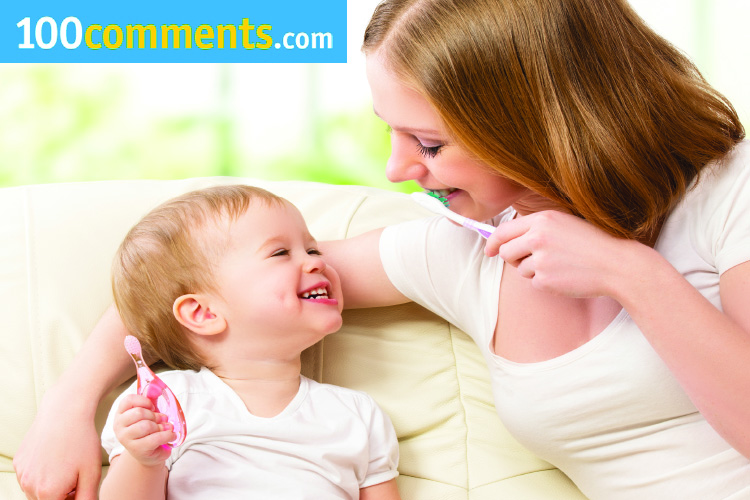Your baby’s dental well-being actually begins in your womb! You can help by maintaining a healthy diet throughout your pregnancy because baby teeth begin to form before birth. During your pregnancy, be sure to eat a balanced, nutritious diet and get an adequate amount of vitamins and minerals.
Table of Contents
Cleaning your baby’s gums
Before your baby’s first tooth pops out, it will be a good idea to get him used to the idea of cleaning his mouth. Bacteria in the mouth usually can’t harm the gums before the teeth emerge, but it can be hard to tell when the teeth are starting to push through.
Wipe baby’s gums with gauze or a soft wet washcloth now and then, so that it will eventually become a habit which can help ease up to teeth brushing. Simply wrap the cloth or gauze around your index finger and rub it gently over baby’s gums. Toothpaste is not needed just yet.
Baby’s first tooth
A baby’s teeth may start to appear around six months of age. Not all babies cut their first teeth before their first year. So if your child is otherwise healthy but still sporting a toothless grin, fret not! Some children don’t start getting teeth until 15 to 18 months. In general, all of the 20 primary teeth should come in between the ages of 6 months and 3 years.
Have a baby toothbrush with a small head on standby. Use a tiny amount of baby toothpaste. Generally, a thin smear of toothpaste or a dot the size of a grain of rice will suffice.
Twice a day, gently brush on the inside and outside of each of your baby’s teeth, as well as the tongue, to dislodge bacteria. Since you’re using such a small amount of toothpaste, you might not need to rinse. Having said that, you can, if you wish to, teach your little one how to spit out the toothpaste so that there will be no problems when using regular toothpaste in the future.
Visits to the dentist
When your child is six months old, your doctor should be able to assess the likelihood of future dental problems. In any case, it would be a good idea to take your child to the dentist after his first tooth erupts or by his first birthday, whichever comes first. In the meantime, do keep a close watch on your little one’s oral well-being. Risk factors include a family history of cavities and poor nutrition while still in the womb.
When you do take your child to the dentist, be sure to communicate whatever oral care issues and questions you may have.
Important fact!
Some parents may wonder why they should take the trouble of taking their toddler to the dentist when his baby teeth will just fall out anyway. Yes, children may lose all their primary teeth eventually, but maintaining healthy teeth is very important to their oral health over the long term. Once a baby tooth gets bacteria in there, it progresses pretty quickly, seeping through the tooth and into the bone, potentially causing infections that can be disastrous to his health! Furthermore, if bacteria are left to lurk in the baby teeth, the enamel for the adult teeth may not be formed properly and may lead to poor dental health for a lifetime.
Foods that prompt baby tooth decay
Sweets (including fruit, dried fruit, juice, and food such as peanut butter and jelly) and starches (such as breads, crackers, pasta, and pretzels) can contribute to cavities. If you plan to give them to your little one, serve them sparingly. Serving them with water is also helpful.
The best snacks for a child are those that don’t come in a plastic package: fresh fruit, fresh vegetables, milk, yogurt, and cheese. Keep some skin your child’s apples and other fruit — the edible peels are where most of the nutrients come from, and they help to clean between the teeth.
Important oral care tip! Resist putting junior to bed with a bottle of milk, formula, juice, or sweetened liquid. These liquids feed bacteria in the mouth and cause tooth decay
















